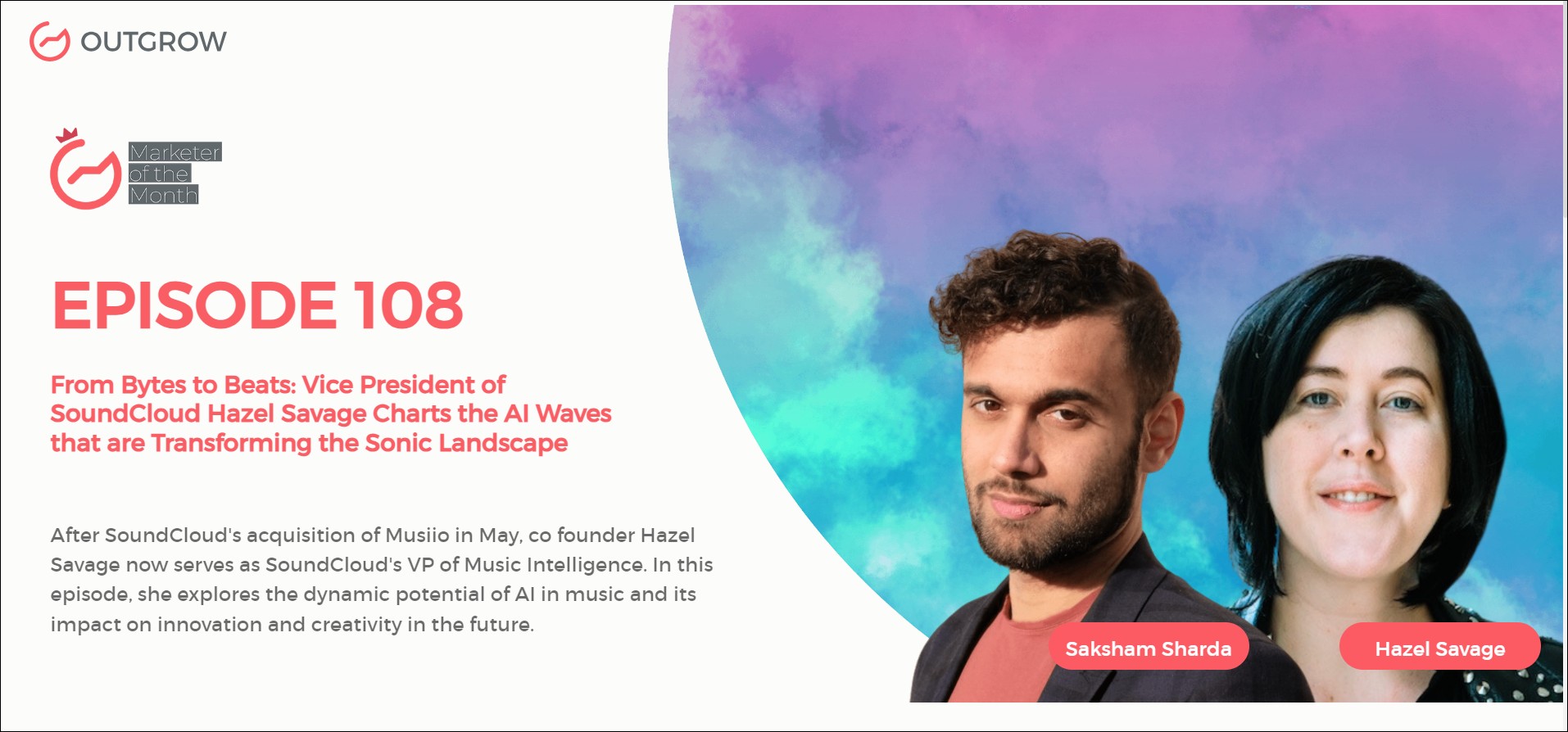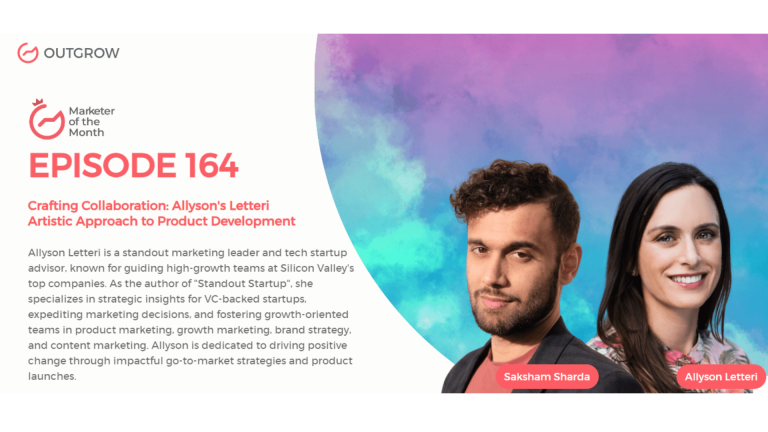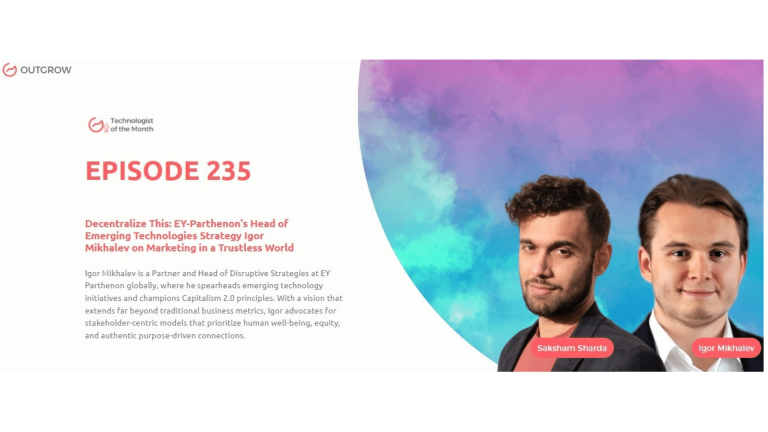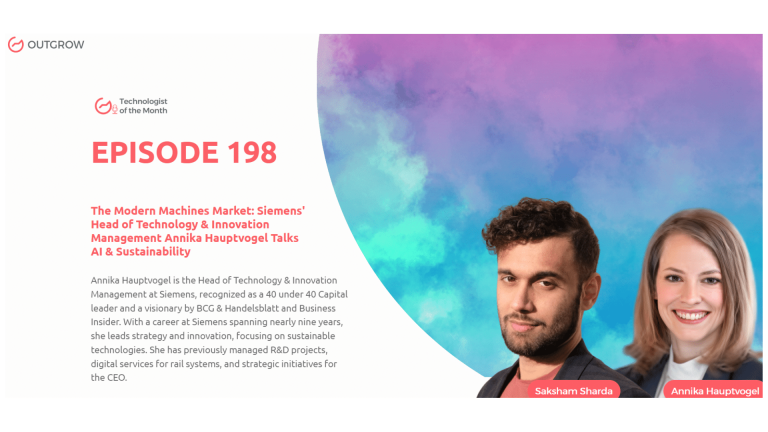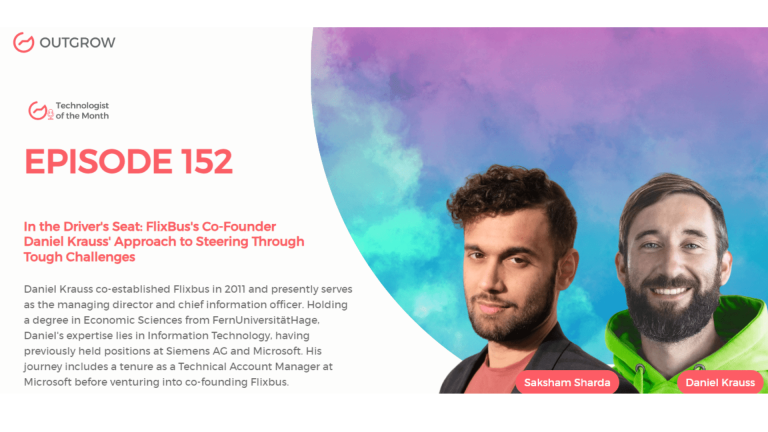Summarize with :
EPISODE 108: Marketer of the Month Podcast with Hazel Savage
Table of Contents
Hey there! Welcome to the Marketer Of The Month blog!
We recently interviewed Hazel Savage for our monthly podcast – ‘Marketer of the Month’! We had some amazing insightful conversations with Hazel and here’s what we discussed about –
1. The Role of AI in Music: Exploring Possibilities and paradigm shifts
2. Challenges of building a music search engine: Scale, efficiency, and algorithms
3. The Acquisition of Musiio by Soundcloud: Challenges and Impact
4. AI’s Potential to create new musical forms: Visual vs Audio-based AI
5. Striking a balance: Algorithms and human curation in music
6. Music classification with convolutional neural networks
About our host:
Dr. Saksham Sharda is the Chief Information Officer at Outgrow.co. He specializes in data collection, analysis, filtering, and transfer by means of widgets and applets. Interactive, cultural, and trending widgets designed by him have been featured on TrendHunter, Alibaba, ProductHunt, New York Marketing Association, FactoryBerlin, Digimarcon Silicon Valley, and at The European Affiliate Summit.
About our guest:
Hazel Savage, a tech expert, guitarist, and former CEO and co-founder of Musiio, brings over 15 years of experience in the music industry. Her journey led her from Shazam to Pandora, Universal Music Group, and HMV before launching Musiio in 2018. Following the acquisition of Musiio by SoundCloud in May, Hazel now holds the position of VP of Music Intelligence at SoundCloud.
From Bytes to Beats: Vice President of SoundCloud Hazel Savage Charts the AI Waves that are Transforming the Sonic Landscape
The Intro!
Saksham Sharda: Hi, everyone. Welcome to another episode of Outgrow’s Marketer of the Month. I’m your host, Dr. Saksham Sharda, and I’m the creative director at Outgrow.co. And for this month we are going to interview Hazel Savage, who is the Vice President of Music Intelligence, at SoundCloud. Thanks for joining us, Hazel.
Hazel Savage: Great to be here. Thank you.
Don’t have time to read? No problem, just watch the Podcast!
Or you can just listen to it on Spotify!
The Rapid Fire Round!
Hazel Savage: Artificial Intelligence for the music industry.
Saksham Sharda: How long does it take you to get ready in the mornings?
Hazel Savage: Five minutes.
Saksham Sharda: A most valuable skill you’ve learned in life
Hazel Savage: Making friends
Saksham Sharda: City in which the Best Kiss of your life happened.
Hazel Savage: London
Saksham Sharda: How many speakers can you name at this conference?
Hazel Savage: Name them or just give them a number. Five.
Saksham Sharda: Name them.
Hazel Savage: Okay, well, everyone on my panel there was Diaa, DJ White Shado, Ryan, myself, Richie Hawtin, Inder Phull.
Saksham Sharda: In one sentence, describe one problem that your company is facing.
Hazel Savage: Hiring.
Saksham Sharda: How do you relax?
Hazel Savage: Watch TV.
Saksham Sharda: A habit of yours that you hate.
Hazel Savage: Scrolling before I sleep.
Saksham Sharda: Work from home or work from the office?
Hazel Savage: Hybrid.
Saksham Sharda: A most embarrassing moment of your life.
Hazel Savage: In a meeting, I spat on a guy’s notebook accidentally.
Saksham Sharda: How many hours of sleep can you survive on?
Hazel Savage: Two.
Saksham Sharda: Your favorite app?
Hazel Savage: Reddit.
Saksham Sharda: Biggest mistake of your career
Hazel Savage: Not quitting earlier.
Saksham Sharda: First movie that comes to your mind when I say the word technology.
Hazel Savage: Cool Runnings. No, I don’t. I don’t watch a lot of movies.
Saksham Sharda: How many cups of coffee do you drink in a day?
Hazel Savage: Up to eight
Saksham Sharda: Favorite Netflix show?
Hazel Savage: Star Trek Voyager
Saksham Sharda: What would you have to say about Elon Musk’s acquisition of Twitter?
Hazel Savage: You do you, honey
The Big Questions!
Saksham Sharda: How did you come up with the idea of an artificial intelligence music curation company in the first place?
Hazel Savage: So I’ve worked in the music industry for a long time. And I kept coming across the same challenges again, and again, and one of those was, it’s fantastic that now the advent of the smartphone allows anyone anywhere in the world to create music. But the industry now needs to catch up. Now anyone can create music? How do we find the best stuff? How do we playlist it? How do we know what we have? And so that kind of that gap in the creative economy is where the idea of music came from.
Saksham Sharda: How fast do you think the industry is going to catch up on this gap?
Hazel Savage: Pretty quick. I think, you know, the artists and creative people in any industry are always at the forefront of change. And then it’s often left a little bit to corporate to play catch up. And which is as it should be, you know, artists lead the way they lead with their creativity, they lead with their design with their efforts with their output. And then the industry we figure out how how to fit around that and how to make the best of their work.
Saksham Sharda: And as if in situations in this where the industry gets it wrong and kind of restricts the artists by accident?
Hazel Savage: Oh, yeah, all the time. Like, you know, I’m old enough to have been here when music streaming was first becoming popular. And the industry thought, oh, okay, streamings are successful. We should all have a streaming service. And I remember when I worked for Pandora in Australia, there were 29 streaming services in the market. No small country needs, Not geographically small, but population size needs 29 streaming services. So that then requires a reset.
Saksham Sharda: Could you share the Genesis story behind the Musiio?
Hazel Savage: Absolutely. I was. I was well, I just left my previous job in Singapore. And I was looking for what I was going to do next. And I was interviewing for a head of marketing at a streaming service. And then I got cold-called about this startup incubator called entrepreneur first. And I thought it might have been a scam because they were like, we’ll pay you to start a company, and And I thought, well, you know, it’s only two, three streets away from where I live in Singapore. They’re offering free coffee, which we already know, I drink a lot of it. So I thought I’ll just go along. And what they do is they bring together a cohort, of like-minded people, and you match up with a co-founder who has complementary technical sales, and business skills, and then you start the idea from there. So I was very, very lucky that um, that I, that I read that email.
Saksham Sharda: You seem to have lived in many places, Australia, Singapore, what else are you hiding?
Hazel Savage: That’s it. That’s all I’m hiding. So yeah, I live in the UK. And I used to live in the UK 12 years ago, but I did five years in Sydney, and I did six years in Singapore, I go where the work is.
Saksham Sharda: And what do you think about the tech scene in Australia versus Singapore versus the UK?
Hazel Savage: You know while I’ve had a great time in all of those scenes. You know, actually, when I was in Australia started at Universal, so I was a major label. And Australia is one of the greatest test beds for new technology. Because it’s a, it’s a Western market, it’s a developed market. But the population size, it’s not huge, around 23 million. So you can really test and run things through there. As well as there’s a lot of developer talent and a lot of musical talent the in the region, it’s really far away from Europe. That’s the downside, the timezone is a challenge. And then Singapore as well, is a hub, such a hub, you can get to the US, you can get to Europe, you can get to Australia, you know, five hours to Japan, four hours to Hong Kong as you name it. And the culture of business in Singapore is also brilliant if you’re looking to build something. So everywhere has its benefits. And it’s been a lot of fun.
Saksham Sharda: The acquisition of Musiio by SoundCloud is a big deal, right? So how did it affect you?
Hazel Savage: It kind of is a big deal. I told someone, I’ll tell anyone who listens, and somebody else said the same thing to me earlier, it’s the hardest thing I’ve ever done. You know, if you ever thought starting a company was hard, if I thought raising money, and we raised $2 million was hard. None of that was hard compared to how hard it is to sell a company, you know, the amount of paperwork, the amount of due diligence, the amount of legal, interpersonal emotional questions, it’s, it’s my biggest achievement today. But I’m very, very proud. One of my favorite memories, it’s not you know, they wouldn’t even be aware of it on the SoundCloud side. But I’d flown back to Singapore, I had to be in Singapore, we were a Singapore company. For about a month, right before we sold, I had some work to do. And I was staying at a friend’s house who owned a tree frog as a pet. And I’d agreed that I would look after this tree frog. Now tree frogs eat live crickets, which is disgusting. And I was feeding this, you have to feed the tree frog every other day with the live crickets. And it’s a real performance. And just for fun, on my last time doing it, I filmed myself doing the whole process. And I think that was about as close to losing my mind as I ever got.
Saksham Sharda: Could you repeat that last sentence?
Hazel Savage: I think that’s about as close to losing my mind during the process as I ever got.
Saksham Sharda: Wow. So if AI is unlikely to create a new musical form, what is next for it?
Hazel Savage: I mean, it may create a new musical form, I think, you know, I always do think AI is best when it’s assistive or not, you know, replacing human beings. But I also think that some of the best technology, technology, startups, and some of the best innovations come out of places that you’d be surprised at. Now, I remember being in school, and they made us do a quiz about what we were going to be when we grew up, and I got bus driver, which actually sounds quite fun, but I am not a bus driver. And I ended up working in music technology because smartphones and apps have become a thing, which no one who designed the quiz when I was at school could have possibly anticipated. So I like a little bit of the unknown. I’m excited to see where we go next.
Saksham Sharda: That’s what they are saying about AI-generated art, that it is not going to feel like it’s gonna make a whole new medium that we’re not even aware of yet. It’s a paradigm change. Is the same thing going to happen with music?
Hazel Savage: Quite possibly, you know, visual-based AI is a little bit ahead of audio-based AI in terms of the technology. So it’ll be interesting to see if they follow each other or if they do diverge. But I think you know, we’re seeing interesting Inklinks with this technology. We’re seeing you know, AI art selling at Sotheby’s or Christie’s we’re seeing you know, AI algorithms creating music, we’re seeing a lot happening with NFT and blockchain. Do I think any of I don’t think any of these things are in their final form? But I think that there is the seed of an idea in all of these things. And we watch where it develops.
Saksham Sharda: Do you think there’s an ideal scope of algorithms in music curation?
Hazel Savage: I think the challenge with using algorithms for music curation is, if you could ask the best music curator, human being in the world to make your playlist, it would be the best playlist. But the reality that we have is if there are millions, hundreds of millions, billions of users on a service, there cannot be one curator per person. So, therefore, what’s the best that we can do at scale? And you know, I used to say the same thing about Musiio. If you want to know the genre, the key, the BPM, the vocal style, auto-tune, energy mood, if you want to know this about a track, get a human to do it, in 10 minutes, they’ll do it, it’ll be perfect. But Musiio does it for 5 million tracks a day. And you know, with all the will in the world, we could hire 1000 people and still not be able to do it. So it becomes about, well, what can we do? And that’s where AI can really help you scale because the alternative is that you just do nothing.
Saksham Sharda: So what kind of music do you listen to?
Hazel Savage: I love a little bit of punk rock. I love a little bit of Alkaline Trio Jimmy World’s guilty pleasure. I’m also really until in my like 80s hair metal like Van Halen, Bon Jovi, but I also like a bit of bluegrass, like a little bit of country music,
Saksham Sharda: Can you hum a tune for us from one of his songs?
Hazel Savage: So me as a performer, or a song I like?
Saksham Sharda: A song you like
Hazel Savage: Could I sing instead? Is that easier? Alright, put on my blue suede shoes and boarded the plane, touched down in the land of the Delta Blues, in the middle of the delta blues
Saksham Sharda: That was amazing. Okay. What are some of the challenges behind building a search engine for music?
Hazel Savage: Scale, you know, if you are a product like SoundCloud, and you have hundreds of millions of songs, storing that data, moving that data, making that data work in the way you want it to, is as much of a challenge as an artificial intelligence challenge.
Saksham Sharda: Can you elaborate a little more?
Hazel Savage: So volume is the main challenge in building a search engine for music. Because, you know, and this is one of the challenges that say Google has solved with text search, which is, you’re not searching everything all at the same time. But how do you batch everything into cohorts so that your search then becomes effective? It’s a bit like shows that when you hold up your phone, and you get the answerback, it hasn’t checked every song in the world, but it’s batched into it goes into a certain batch where it knows the answer is likely to be. So it’s algorithms on top of algorithms, it’s efficiencies. And creating a search for music is much the same. If you want to run, you know, if I want to fingerprint an audio file, and search that against everything on SoundCloud, say there are 350 million tracks, that search would take a while to conduct. But most people aren’t going to sit and wait maybe 30 minutes for a search to complete, we expect it instantly. So how have we formatted the back end? So that it knows what I’m asking instantly? And it knows straight in the bucket? To go to to get the answer so that it feels like less than a second. I press go and the answers are popping up on the page already. That’s the biggest challenge.
Saksham Sharda: What are the different types of machine learning algorithms that are used for this?
Hazel Savage: Well, at Musiio, we did convolutional neural networks to be able to build classifiers that could identify data. And the way I talk about that is I think about it is our AI was able to identify anything if you give it sort of two to 5000 examples. So if you want it to understand pop, rock, electronic, techno trance, you know, we do at four different genres, we would give it say 2000 examples that typify that music, legally, of course. And then we ask it to learn, we ask it to look at those patterns. Look at that similarity. And then the next time you show it, something that it’s not seen before it again, it looks at the pattern, and it compares that to what it’s learned before. And that’s how it’s able to tell you what the genre is.
Saksham Sharda: So what is the future of pattern learning then?
Hazel Savage: The future of pattern learning is how you create the smallest and simplest file from which you can identify something accurately, you know, the data files are huge, and it needs to be affordable. So you need to shrink the fingerprint down to be able to run this technology. But you also need to be able to have high accuracy. You know, you really need 90% plus. So balancing those two things scale with accuracy is a great challenge as we move forward with more and more data every day.
Saksham Sharda: The last question for you is of a personal kind, what would you be doing in life if not this right now?
Hazel Savage: I think I would be running a cat rescue. I have a little old three-legged Persian cat that I rescued in Singapore. And I love cats and if I had a lot more free time, I would love to like volunteer at a rescue. I would love to do you know TNR trap neuter release I am very passionate about cats in particular, and miniature ponies and I think that would just bring me a lot of joy. So that’s on my to-do list.
Let’s Conclude!
Saksham Sharda: Thanks, everyone for joining us for this month’s episode of Outgrow’s Marketer of the Month. That was Hazel Savage, the Vice President of Music Intelligence, at SoundCloud. Thanks for joining us, Hazel.
Hazel Savage: Pleasure. Thanks for having me.
Saksham Sharda: Check out the website for more details and we’ll see you once again next month with another marketer of the month.

